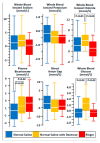Maintenance Fluid Therapy with Saline, Dextrose-Supplemented Saline or Lactated Ringer in Childhood: Short-Term Metabolic Effects
- PMID: 32429568
- PMCID: PMC7284774
- DOI: 10.3390/nu12051449
Maintenance Fluid Therapy with Saline, Dextrose-Supplemented Saline or Lactated Ringer in Childhood: Short-Term Metabolic Effects
Abstract
Maintenance with isotonic fluids is recommended in children with gastroenteritis and failure of oral rehydration therapy. However, little is known on the short-term effects of the commonly prescribed intravenous solutions on metabolic balance in children. The aim of this study is to report on our experience with normal saline, dextrose-supplemented saline and lactated Ringer solution.
Methods: A retrospective analysis from the charts of all previously apparently healthy children with acute gastroenteritis, mild to moderate dehydration and failure of oral rehydration, evaluated between January 2016 and December 2019 at our institution, was performed. Subjects prescribed the above-mentioned maintenance intravenous fluids and with blood testing immediately before starting fluid therapy and 4-6 h later, were eligible. The changes in bicarbonate, ionized sodium, potassium, chloride, anion gap and glucose were investigated. Kruskal-Wallis test with the post-hoc Dunn's comparison and the Fisher exact test were applied.
Results: A total of 134 out of 732 children affected by acute gastroenteritis were included (56 patients were prescribed normal saline, 48 dextrose-supplemented normal saline and 30 lactated Ringer solution). The effect of the three solutions on sodium and potassium was similar. As compared to non-supplemented normal saline (+0.4 (-1.9 - +2.2) mmol/L), dextrose-supplemented normal saline (+1.5 (+0.1 - +4.2) mmol/L) and lactated Ringer (+2.6 (+0.4 - +4.1) mmol/L) solution had a positive effect on plasma bicarbonate. Finally, the influence of dextrose-supplemented saline on blood glucose was different (+1.1 (+0.3 - +2.2) mmol/L) compared to that observed in cases hydrated with non-supplemented saline (-0.4 (-1.2 - +0.3) mmol/L) or lactated Ringer solution (-0.4 (-1.2 - +0.1) mmol/L).
Conclusions: This study points out that maintenance intravenous therapies using normal saline, dextrose-supplemented saline or lactated Ringer solution have different effects on metabolic balance. A personalized fluid therapy that takes into account the clinical and biochemical variables is advised.
Keywords: fasting; fluids; hydration; isotonic solutions; ketosis; metabolic acidosis.
Conflict of interest statement
The authors declare no conflict of interest.
Figures

Similar articles
-
5% Dextrose in Ringer's Lactate versus 5% Dextrose Normal Saline as Maintenance Intravenous Fluid Therapy in Children - A Randomised Controlled Trial.Indian J Pediatr. 2025 Jul;92(7):725-730. doi: 10.1007/s12098-024-05077-2. Epub 2024 Mar 19. Indian J Pediatr. 2025. PMID: 38502269 Clinical Trial.
-
Normal Saline Solution and Lactated Ringer's Solution Have a Similar Effect on Quality of Recovery: A Randomized Controlled Trial.Ann Emerg Med. 2019 Feb;73(2):160-169. doi: 10.1016/j.annemergmed.2018.07.007. Epub 2018 Aug 23. Ann Emerg Med. 2019. PMID: 30146446 Free PMC article. Clinical Trial.
-
Intravenous dextrose for children with gastroenteritis and dehydration: a double-blind randomized controlled trial.Ann Emerg Med. 2013 Mar;61(3):281-8. doi: 10.1016/j.annemergmed.2012.08.007. Epub 2012 Sep 6. Ann Emerg Med. 2013. PMID: 22959318 Clinical Trial.
-
Balanced crystalloid solutions versus 0.9% saline for treating acute diarrhoea and severe dehydration in children.Cochrane Database Syst Rev. 2023 May 17;5(5):CD013640. doi: 10.1002/14651858.CD013640.pub2. Cochrane Database Syst Rev. 2023. PMID: 37196992 Free PMC article.
-
Rehydration: role for early use of intravenous dextrose.Pediatr Emerg Care. 2009 Jan;25(1):49-52; quiz 53-4. doi: 10.1097/PEC.0b013e318191d97c. Pediatr Emerg Care. 2009. PMID: 19148016 Review.
Cited by
-
Eu- or hypoglycemic ketosis and ketoacidosis in children: a review.Pediatr Nephrol. 2024 Apr;39(4):1033-1040. doi: 10.1007/s00467-023-06115-5. Epub 2023 Aug 16. Pediatr Nephrol. 2024. PMID: 37584686 Free PMC article. Review.
References
-
- Guarino A., Ashkenazi S., Gendrel M., Vecchio A.L., Shamir R., Szajewska H. European Society for Pediatric Gastroenterology, Hepatology, and Nutrition/European Society for Pediatric Infectious Diseases Evidence-Based Guidelines for the Management of Acute Gastroenteritis in Children in Europe. J. Pediatr. Gastroenterol. Nutr. 2014;59:132–152. doi: 10.1097/MPG.0000000000000375. - DOI - PubMed
Publication types
MeSH terms
Substances
Grants and funding
LinkOut - more resources
Full Text Sources
Medical
Research Materials
Miscellaneous

